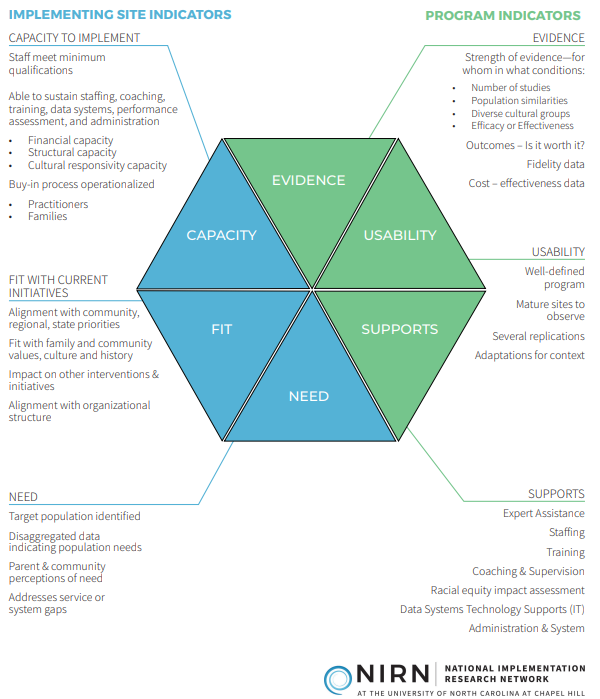Readiness
Before You Begin
So you're interested in implementing a multi-tiered system of supports framework? That's great! We want you to understand what this work takes before jumping right in. Making improvements at all tiers of support and in academics, behavior, and social-emotional learning is a daunting task. To do this well, we find that elementary schools typically need 3-5 years for implementation, and at the secondary level, it's even longer. It can be hard to focus on improving both academics and behavioral/social-emotional areas simultaneously, and as a result, schools may choose to focus on one area over another to avoid overcommitment.
MTSS Rhode Island recommends beginning with a tool designed to help schools and districts better understand how new work fits into the existing work. The Hexagon Tool, developed by the National Implementation Research Network (NIRN), prompts organizations to consider specific indicators when considering taking on new work. Implementation indicators include Capacity, Fit, and Need, and program indicators include Evidence, Usability, and Supports. The graphic below, as well as NIRN's webpage on the Hexagon Tool (opens in a new window) and its accompanying materials, are great supporting resources for considering implementation of MTSS.

The Hexagon Tool, National Implementation Research Network at the University of North Carolina at Chapel Hill, licensed under the Creative Commons
Text-only version of the Hexagon Tool
The Hexagon Tool prompts leaders interested in undertaking new work to assess fit and feasibility. For example, how will buy-in and consensus-building be addressed? Do stakeholders such as staff and student families see a need for this work, and are they ready to undertake new work? Does MTSS fit with current initiatives and priorities?
The Importance of the District Role
As you can see from the Hexagon Tool above, there are many questions to consider when beginning any new work. Some of those questions must be answered at the district level, such as questions around capacity, supports, and fit with larger district priorities, such as:
- Will the district provide and sustain the necessary staffing to implement?
- Will the district data systems support the work?
- Will the district provide adequate funding for professional learning and coaching needed?
- Does the need for MTSS in a school or schools align with the district's overarching priorities and goals?
To this end, the role of the district is critical in implementing the MTSS framework and its supporting elements. District support is necessary for resource allocation, including time, scheduling, professional learning, coaching, materials, and any other supports needed to implement MTSS.
Needs Assessment
The MTSS framework consists of the Practices, Data, and Systems that work together to improve and/or maintain successful student outcomes. Practices are what we do to support students - such as curriculum, instruction, interventions, strategies, the list goes on. Data includes what we collect to understand how students are doing and how we use that information to improve our support. Systems are what we do to support adults, such as professional learning, communities of practice, and allotting planning time, among other things. Every school and district already has elements of these three critical areas in place and is starting from somewhere.
MTSS Rhode Island begins at that starting place and assists schools and districts in conducting a needs assessment. The needs assessment process consists of reviewing current outcomes and identifying areas of strength and growth. Those outcomes include academic, behavioral, and social-emotional measures so that together, we can decide on an area or areas of focus for the school. We also look at the current infrastructure and implementation in the school building, for example:
- Do you have a team in the building that looks at school-wide practices? Does that team meet regularly, and does it include representation from different grade levels, content areas, and specializations?
- Do you screen regularly for math, reading, social-emotional outcomes, and school-wide behavior?
- Are there interventions in place, and are those interventions evidence-based and implemented with fidelity?
These are just a sampling of questions that we answer with you as we begin planning supports and professional learning for your building. Every school is starting somewhere. We'll meet you there!
So you're ready to begin...
Implementing a multi-tiered system of support framework and making improvements to areas of need is a challenging undertaking. Consider the Knoster Model for Managing Complex Change. To successfully manage complex systems change, organizations need the vision, skills, incentives, resources, and an action plan. As you can see from the model, if any of those pieces are missing, the outcomes can vary. For example, if the requisite skills needed to carry out a change are missing for the people who are implementing those changes, that will lead to anxiety.
Knoster Model for Managing Complex Change
Text-only version of the Knoster Model for Managing Complex Change
We'll address these critical areas with schools and districts as they begin. Other critical steps for successful systems change include:
- Team formation - we'll help you form teams with the right team members for your context and establish evidence-based practices for team success
- Communication plan - together, we'll develop a communication plan so that key stakeholders, such as staff and parents/families, understand what MTSS is, why it's being implemented, and what changes they'll see. The communication plan will address both short-term and long-term communication needs.
- Planning for obstacles - what happens when a key team member leaves? What happens when there's a shift in leadership? We'll plan to build a system that supports MTSS, so its implementation remains consistent when other factors change.
